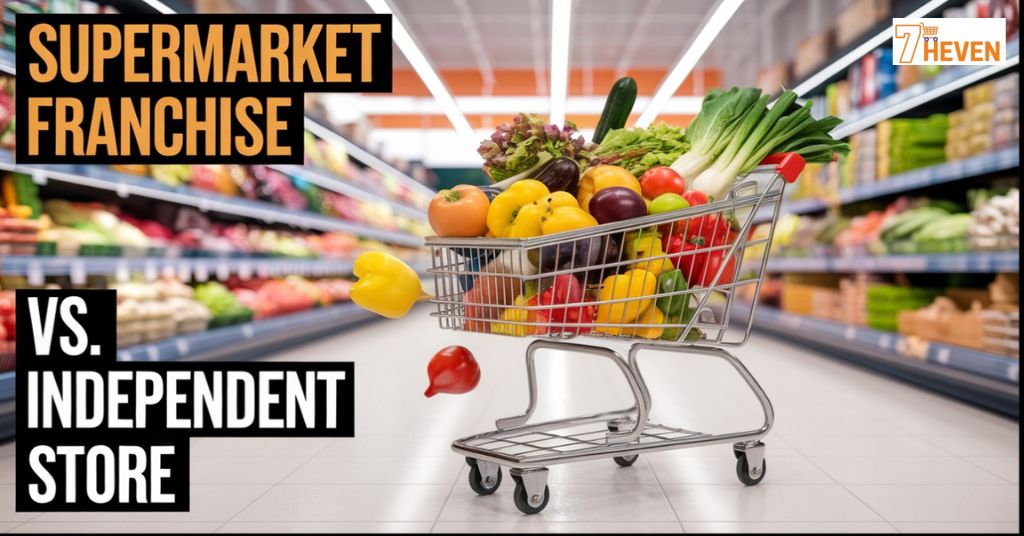Is Investing in a Supermarket Franchise Profitable? A Deep Dive into ROI & Success Rates
Supermarket business is a super flexible business model that requires utmost attention at first. For having a constant profitable ROI, supermarket franchise business owners must know about the market, customers, and the very factors of it. From this article, you will know everything about investing in a supermarket franchise profitably. It offers an insight into the requirements for opening supermarkets. These include covering the costs as well as revenue sources, and success factors. What You Should Understand About the Costs Involved with Supermarket Franchise? Definitely, it is of utmost importance to appreciate the costs involved in establishing a supermarket franchise. The initial investment would typically comprise several areas. First and foremost, franchise fees are the initial amount to be paid to join a franchise, which vary considerably from one brand to another. These fees often comprise any necessary training, support, and the right to operate under the brand name. Secondly, setup costs arise that include interior renovation, equipment, and signage. These could include shelving systems and systems for refrigeration. Last but not least comes the realm of operational costs, which could include utilities, insurance, and any necessary services. These costs could add up very fast, so a detailed budget is needed. Investing in a Supermarket Franchise means being aware of ongoing costs, which are quite huge. Inventory is one of the most major ongoing expenses to consider, since it is critical to keep fresh produce and household supplies coming in for the attraction of customers. Then there are the other ongoing expenditures: staffing, meaning hiring and training employees to run a smooth operation. Marketing will be a major expense, as will repair work to maintain store conditions. Being aware of these costs can teach you to keep a proper tabulation in planning your budget and avoid facing any unpleasant surprises. Revenue Streams in a Supermarket Franchise Supermarkets possess multiple streams of income that could improve overall profits. The major sources of revenue include groceries, the principal revenue source. This involves food and beverages. Household goods, such as cleaning and personal care products, contribute significantly to the larger sales picture. Fresh and organic produce lures health-conscious customers into the store. In addition to primary sources of revenue, supermarkets enjoy several secondary sources of income as well. The modern shopper prefers to shop online so providing services for either delivery or pickup is a great way to increase sales. In this digital age, where convenience is everything, this becomes a must. Discounts and offers help bring back customers, generating loyalty. A diversification of income streams can help improve profitability of your supermarket franchise. It works as a safeguard and thus is a major requirement for opening supermarkets. Also read this : How to Choose the Best Location for Your Supermarket Franchise. Factors That Impact Profitability There are various factors that can impact the profitability of a supermarket franchise. Of these, the most important one is location and foot traffic. Choosing the right location is critical. Footfalls increase in busy areas due to visibility and customer traffic. Demographics play a vital role in making up the area’s customer base. With proper market research, the best locations can be earmarked. These locations could foster communities, which is one of the biggest factors to consider if you are looking for how to open a grocery store in India. Inventory turnover and negotiations with suppliers are similarly an equally important factor. Proper inventory management avoids wastage and guarantees fresh products, thus ensuring customer satisfaction; good negotiations with suppliers guarantee winning pricing and terms for you, allowing relation-based negotiations with your customers. In addition to these, pricing strategy and competitive market positioning are also very vital to drawing customers in. The supermarket should be priced competitively according to local market dynamics. These factors together determine your success when investing in a Supermarket Franchise. Expected ROI & Break-Even Period Proposed franchise owners must understand what ROI and break-even mean to them. Generally, supermarkets take 1 to 3 years to reach the break-even point. It highly depends on the site of the franchise and management efficiency. If you analyse how long it would take to earn profits, you could strategize accordingly. Key indicators of financial performance to monitor include- Gross margin, which indicates the amount of sales minus the cost of goods sold. Net Profit margin, which tells the story of what is left after all expenses are incurred. Sales growth is also an important metric to take note of since tracking sales will indicate how the business really is doing over time. Monitoring the above lets you have a clear pathway to profit and helps you make decisions. These measures will also help you get the consideration of potential investors or gain financing. What You Should Learn from Case Studies & Success Stories? Learning from successful supermarket franchises will teach many lessons. Popular strategies include building customer loyalty through reasonable prices and generous rewards. People prefer to visit a place again if they feel they are getting their money’s worth. They may also be happy redeeming it later with coupons and vouchers. The successful franchise owners prioritize customer service and connecting with the community. They adapt to market trends rapidly to satisfy the customers’ needs. These cases give the supermarket franchise model a possibility for success and many instructive lessons for aspiring franchisees. For instance, Trends, Big Bazaar and Reliance Fresh have made strides with innovative strategies. Apart from hefty discounts and generous rewards, seasonal promotions are often a good lure to bring back the customers. The experiences of these three, and many more franchises across the country can provide you key insights for any new franchise owner. Risks & Challenges for new Owners: Investing in a supermarket franchise entails inherent risks and challenges. Rising costs tend to squeeze profit margins during economic downtime. For instance, with an economic downturn, prices increase due to limited availability but consumer spending lowers further because of prices. This would directly affect sales of luxury goods and even essential
Is Investing in a Supermarket Franchise Profitable? A Deep Dive into ROI & Success Rates Read More »










